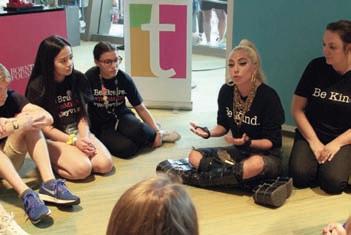
9 minute read
40 YEARS OF RESEARCH HIGHLIGHTS
40 Years of Research Highlights
SIDS - The incidence of SIDS (cot death) was reduced by 80%
The first research project funded by Australian Rotary Heath was the study of Sudden Infant Death Syndrome - SIDS (cot death). Research was carried out at the Menzies Centre in Hobart by Prof Terry Dwyer. As a direct result of this research, the incidence of SIDS worldwide was reduced by 80% Lung Transplant Program - patients are achieving a 95% survival rate after 2 years and the number of deaths while on the waiting list has reduced from 29% to 3%.
Professor Gregory Snell found a way to increase the supply of organs with a new technique for recovering organs from cardiac-dead donors. The research, translating ultimately to human transplant success in 2006, involved using a heart-lung bypass machine circuit to assess the function of lungs, kidneys and livers recovered up to hours after death. The team showed it was safe and practically possible to recover lungs up to 60 minutes, and kidneys and livers up to 30 or more minutes after death.


Mental Health First Aid - Teaching individuals in more than 25 countries to recognise symptoms of mental health problems and how to give initial help.
Professor Tony Jorm and his wife Betty Kitchener are the brains behind the Mental Health First Aid program. Since its inception in 2000, over 3 million people have been trained in Mental Health First Aid globally, over 25 countries have adopted MHFA, over 800,000 Australians have completed the course, and over 4500 MHFA courses are run in Australia each year. Research funding has also led to the development of Teen Mental Health First Aid (tMHFA), which teaches high school students in years 10-12, and years 7-9, how to provide mental health first aid to their friends. Cool Kids Program - 2 in 10 children experience anxiety, this worldrenowned program helps children and parents manage their children’s fears and worries.

Professor Ron Rapee developed the Cool Kids program, a self-help, multimedia program to relieve anxiety symptoms in teens aged 14-18 years. Ron and his team evaluated the efficacy of the program, which found that teenagers showed significantly greater reductions on most measures than teenagers on the waiting list. The program has since been extended, adapted for online use, and has helped children with anxiety in more than 20 countries worldwide.
Diet - research has shown a link between ‘western style’ diets and depression and anxiety.
Professor Felice Jacka investigated the association of diet with depression and anxiety. It was found that a “traditional” diet (mainly consisting of vegetables, fruit, beef, lamb, fish and whole grain foods) was associated with lower risk of depression and anxiety, while the “western” diet (mainly consisting of meat pies, processed meats, pizza, chips, hamburgers, white bread, sugar, flavoured milk and beer) was associated with higher risk.
2020-2021 Research Highlights
Professor Gin Malhi An Australian Rotary Health funded study has found clear differences in the way a brain functions in a person experiencing suicidal thoughts.
Professor Gin Malhi and his team at the University of Sydney were awarded an ARH Mental Health Research Grant from 20172019 to conduct MRI scans on suicidal patients at the Royal North Shore Hospital, to better understand what might be happening in their brains.
A key result from the study has helped to show how different brain networks function during times of suicidal thinking.
Professor Malhi says that certain brain regions that are involved in self-reflection and responding to other people are impacted in patients with higher levels of suicidal thinking.
“We have found that an abnormal emotional response, like irritability or withdrawing from others, is one of many contributing factors which may help to maintain suicidal thinking,” Professor Malhi said.
Another interesting finding was that there were also clear differences in brain function between patients who were experiencing thoughts of suicide and those who were not.
Dr Pritha Das, a Neuroimaging Scientist on the research team said these findings have both clinical and scientific value.
“Our research has shown that those who have attempted suicide, even once at some point, have altered their brain from those who have never attempted,” Dr Das said. Now that these findings have helped to understand how suicide occurs, Professor Malhi and his team are looking at how certain medications may help patients specifically recover from suicidal thinking.
“Our future research aims involve pairing our brain scanning findings with treatment study findings when medications and psychological therapies are used. This will help us understand how treatments might target suicidal thinking specifically,” Professor Malhi said.
Professor Malhi has had 10 journal articles published as a result of this research. You can hear him speak more about it on episode 24 of the Research Behind Lift the Lid podcast.
Associate Professor Caroline Donovan In a study funded by an ARH Mental Health Research Grant, Associate Professor Caroline Donovan from Griffith University led a team of researchers in a world first investigation of whether the treatment of sleep problems in young children reduced and prevented the emergence of anxiety and behavioural problems.
The study found that the sleep program ‘Lights Out’ was highly effective in reducing sleep problems in young children.
Additional benefits of the program included less resistance from the children around going to bed, less anxiety at bedtime, longer sleep during the night and less sleepiness during the day. “I’m really passionate about treating kids as early as we possibly can so that we can prevent all those other issues happening later,” A/Prof Donovan said.
The research also found that those who received treatment showed a significantly greater reduction in anxiety and behavioural issues, both immediately after the treatment and after their first semester of schooling.
Caroline hopes that outcomes from the study will provide new directions for improving sleep, mental health problems, and preparedness for early major life transitions in young Australians.
You can listen to Caroline’s findings on episode 27 of the Australian Rotary Health podcast, The Research Behind Lift the Lid.
Professor Alison Calear Australian Rotary Health Mental Health Research Grant recipient Professor Alison Calear and her colleagues at the Australian National University recently published an article in the journal Suicide and LifeThreatening Behavior on the trial of the Silence is Deadly program – a public health intervention designed to prevent suicide through the promotion of early help-seeking for emotional problems.
This evaluation aimed to find out if Silence is Deadly improves young men’s intentions to seek help for emotional problems (like worry or sadness) and personal problems (like bullying or a break-up).
Findings showed that around 6-12 weeks after attending the Silence is Deadly presentation (delivered by Menslink and the
Canberra Raiders NRL team), Year 11 and 12 students reported significantly higher intentions to seek help from a friend for emotional problems, compared to a control group of students who had not attended the presentation.
“This finding is in line with the predominant messaging of the Silence is Deadly program, which encourages participants to seek help from and provide support to friends in times of distress or suicide risk,” Professor Calear said.
The study also asked teachers about the program, with most of the participating staff members reporting that the Silence is Deadly presentation had improved male students’ help-seeking attitudes and knowledge about sources of help.
Half of the staff members had also observed some change in help-seeking behaviours in their school.
With males accounting for nearly threequarters of suicide deaths in Australia, evidence for tailored programs like Silence is Deadly may fill an important gap.
“The program may have beneficial effects on adolescent men’s help-seeking intentions; a key issue that needs to be prioritised and addressed in this age and gender group,” Professor Calear said.
Listen to episode 40 of the Research Behind Lift the Lid podcast to hear more about this research.
Josie Povey Ian Scott PhD candidate Josie Povey has developed a new mental health smartphone app for Aboriginal and Torres Strait Islander youth.
Josie has engaged over 100 Aboriginal and Torres Strait Islander young people, an expert reference group, and a team of experienced researchers in the design and development of the ‘The Aboriginal and Islander Mental Health Initiative for Youth (AIMhi-Y)’ app. “The AIMhi for Youth App is a strengthsbased self-driven smartphone app which has been designed with Aboriginal and Torres Strait Islander young people to address the current unmet need for services in the early intervention mental health setting,” Josie said.
Josie says the findings from her PhD project have highlighted the strengths and challenges facing Aboriginal and Torres Strait Islander young people (aged 10-18) in regional and remote centers of the Northern Territory.
“While many young people were connected to things that keep them strong, like family, sport, art, and culture, many also experienced challenges, including distress and exposure to suicidal behaviour,” she said.
In her research, Josie identified that digital mental health tools specifically designed to suit the needs of Aboriginal and Torres Strait Islander young people may be one way to increase access to mental health care.
It was noted that preferred app features included storytelling through characters and videos, mini games to promote mindfulness, and features such as rewards and notifications.
“This project has engaged a wide and diverse group of Aboriginal and Torres Strait Islander young people across regional and remote centers in the Northern Territory. It has been a pleasure to work with passionate, knowledgeable and proud young people who are interested in helping their families and peers.”
You can hear more about the research findings on episode 46 of our podcast The Research Behind Lift the Lid. Anna Ross Ian Scott PhD Scholarship recipient Anna Ross’ research has informed the development of new media guidelines on media reporting of severe mental illness in the context of violence and crime.
This new resource empowers safe and responsible reporting on the issues of mental illness in the context of violence and crime, which seeks to minimise stigma and promote help-seeking behaviour.
The guidelines provide insight around: • The impact of news reports on mental illness and crime • How to report on the issues accurately • How to incorporate and provide relevant context • The use of supportive and personcentred language • The provision of help-seeking information • Selection and framing of supportive video and images • Steps for responsible discussion of the issue via social media • Opportunities for further training and mentoring.
“The media can play an important role in challenging stigma and stereotypes about mental illness,” Anna said.
Visit the Mindframe website to see the guidelines.











